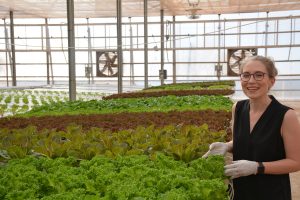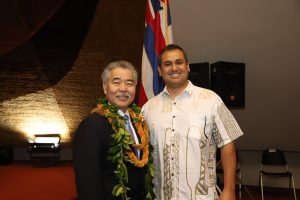Agriculture and self-sufficiency: Sensei Farms, Mahi Pono
Posted on Jan 30, 2020 in Capitol Connection, FeaturedPerhaps the longest transition we have experienced recently has been the transformation of our agricultural industry from large-scale farming to more diversified farms. But there is one important difference in today’s efforts from yesterday’s: And that’s technology. As in other fields, we have seen the rise of technology change the face of everything in society. In agriculture, it too has been a game changer. It has enabled farmers to produce higher yields in the field and more precise targeting strategies in the marketplace. Consequently, we are seeing a greater willingness to invest in local agricultural endeavors.

Molly Stanek, senior vice president of Sensei Farms Lana’i, with lettuce from one of their hydroponic greenhouses.
Over the last several weeks, we have seen a number of news articles on agricultural start-ups. Mahi Pono, which bought 41,000 acres of former sugar cane land, is raising potatoes in central Maui. And they want to plant another 120 acres of citrus trees and 20 acres of non-GMO papayas. Their plans also include growing avocados, bell peppers, guava, lilikoi, oranges, lemons and limes. Sensei Farms is transforming agriculture on Lanaʻi by using a mix of proven and innovative technology to power its hydroponic greenhouses on former pineapple fields. This mix of traditional farming and new technology is the wave of the future for agriculture statewide. I would also like to acknowledge state senators Donovan Dela Cruz and Mike Gabbard and representatives Richard Onishi and Richard Creagan, who have long been strong advocates for agriculture in Hawaiʻi.
